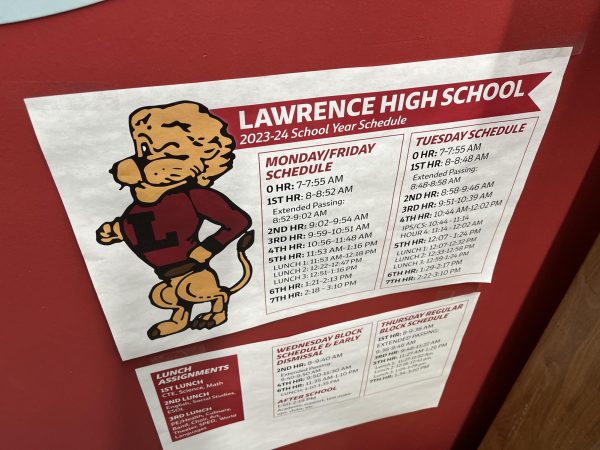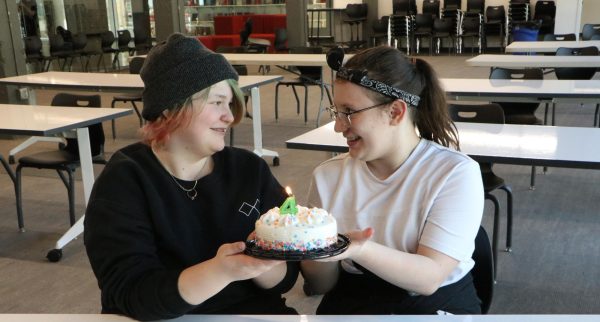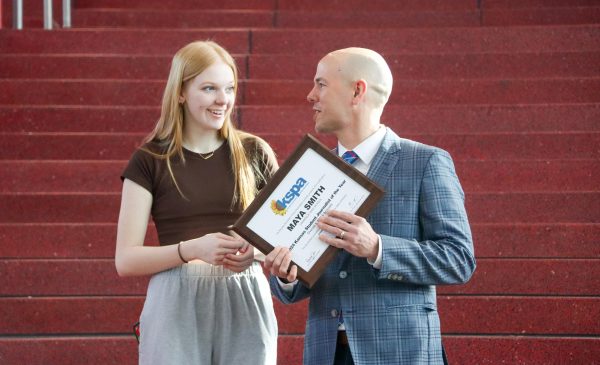Taylor Swift has done it again
Album Review: Midnights by Taylor Swift
A disc of Taylor Swift’s new album “Midnights” hangs out of a CD player.
November 11, 2022
By now, you’ve definitely heard people talking about Taylor Swift’s most recent album, Midnights. If you are looking for something to sing along with in the car, to deeply analyze, or to support your late-night reflections, you need to give Midnights a listen.
Swift has set high expectations for herself with her now ten-album discography, and she met them once again. Midnights gets better with each listen, and I haven’t stopped listening since its release on October 21st.
Midnights is a callback to Swift’s other pop albums: 1989, reputation, and particularly Lover—a mostly-upbeat ode to love itself.
Swift is finishing a chapter that the pandemic interrupted. She never got to complete her Lover era, and she is going back for it now. Both albums complement each other thematically and sonically. I expect to see mash-ups of songs from Lover and Midnights on Swift’s upcoming Eras Tour.
I enjoyed the positivity exhibited by the album, particularly in Bejeweled and Karma. Swift is moving on and making peace with herself—and she is elated.
Those who became so-called “Swifties” after folklore and evermore were released may be disappointed by the energy of Midnights, but Swift is out of quarantine, in the sixth year of her relationship with British actor Joe Alwyn, and having a good time.
Midnights covers many themes present in all of her past work. Beginning with her debut self-titled album in 2006, Swift has explored concepts of identity throughout her cross-genre career. She writes about being influenced and hurt by outside opinions. From high school bullies to millions of haters on Twitter, Swift has always faced critical opinions, deeply affecting her self-image. She investigates this anxiety on Midnights.
Through all thirteen tracks, Swift shows the complexity of self-perception. Is it possible to separate yourself from your reputation? Does it really matter what other people think of you, anyways? These are the questions that keep her up at night and the questions that drive the entire Midnights album.
Lavender Haze opens the album with a call to “meet me at midnight.” It takes just over thirty seconds for Swift to mention people talking about her. “I’ve been under scrutiny,” she declares, “you handle it beautifully.” Her anxiety is reconciled by her unbothered partner. She also calls out the sexism displayed by ongoing rumors regarding her relationship with Alwyn. “The only kind of girl they see is a one-night or a wife,” she asserts in this album opener.
Maroon, titled after yet another shade of red, embodies the classic characteristics of Swift’s narrative style. She fabricates a story about an old (and likely fictional) relationship. She details memories of dancing, New York, and wine. Classic Taylor.
Midnights’ production most distinguishes it from her past albums. Yes, it’s a pop album — the indie-hipsters aren’t satisfied. But almost entirely crafted with seven-time Grammy-winning producer Jack Antonoff, Midnights has a pulsing synth-pop style that differentiates it from her past pop-works. The heavy use of synth-bass gives the album a nocturnal sound that brings it together, most evident in Midnight Rain. It’s the album to listen to when you’re up at night.
Swift has worked with Antonoff on every album since 1989, but never to this extent. He collaborated on all but one of the thirteen songs that make up Midnights. Though, I wish he had gone to sleep while Swift wrote a few of these tracks, so that maybe some would resemble her earlier works that she wrote alone.
But at her core, lyricism is what sets Swift apart from other artists. No matter the genre, Swift is consistent with her striking lyrics. This is most evident in Midnights’ fifth track. Swift is known to set her most heart-wrenching song on each album as track five. You’re on Your Own, Kid fills this role beautifully. Its agonizing bridge will hit seniors getting ready to leave their hometowns particularly hard. “There were pages turned with the bridges burned,” Swift contends, “everything you lose is a step you take.”
However, not every line takes on this level of complexity, and frankly, I may enjoy them more. Track nine contains bits of intriguing metaphors. “Familiarity breeds contempt/don’t put me in the basement when I want the penthouse of your heart,” Swift begs in Bejeweled. As compelling as this line is, I find myself screaming the simple lines much more often. “I can still make the whole place shimmer,” Swift declares spitefully in this chorus.
Midnights features alternative-pop artist Lana Del Rey on its fourth track: Snow on the Beach. Many Del Rey fans were disappointed that her voice wasn’t more prevalent, but I found that she complimented Swift’s voice wonderfully. Maybe if you didn’t think you could hear her you should turn up the volume or listen on something besides a cell phone.
My one complaint is Vigilante Sh*t. “Draw the cat eye sharp enough to kill a man,” she opens. It feels as though she tried to write like a 2014 Tumblr post and sound like Billie Eilish. If this was intended to be a “feminist anthem,” it failed miserably.
Swift’s take on feminism is present in other parts of the album as well. “Sometimes I feel like everybody is a sexy baby,” she confesses in the self-loathing lead single, Anti-Hero, “and I’m a monster on the hill.” This line has proven to be controversial. It makes people uncomfortable. But I think that was the point. She wanted to make a point about how society views women, a trend that has heavily impacted Swift’s life. The discomfort and widespread debate over this line effectively achieved her goal — to make people think about it.
One song that stands out from the rest of the album is Sweet Nothing, a soft piano ballad that reflects the purity of her current relationship. Alwyn even wrote this song with her, under the pseudonym William Bowery. This isn’t the first time he’s assisted her—or been her inspiration. Taylor recounts a pleasant interaction representative of their love. “On the way home, I wrote a poem/you say ‘what a mind’, this happens all the time,” Taylor sings like a lullaby, backed by a harp. It simply warms my heart, and beautifully approaches the album’s conclusion.
Swift’s inner reflection is epitomized in the album’s final track: Mastermind. Swift basically calls herself manipulative because she didn’t have friends when she was a kid. “I’m only cryptic and Machiavellian ’cause I care,” she claims. She seems to have internalized the longtime rumors calling her “crazy,” or may be making fun of them. She reveals in the final verse that she didn’t actually manipulate her boyfriend of six years into loving her. “You knew the entire time,” Swift realizes, closing the album, “you knew that I’m a mastermind.”
Though, Swift may actually be a mastermind. If you look hard enough, you’ll find Easter Eggs hinting at this album years ago. She definitely doesn’t “fail to plan.”
More than anything, I am excited for what has yet to come. Going on tour for the first time since 2018, four new albums later, I’m sure Swift has much left in store for her fans. The album proves that she is not done releasing fun, danceable music. Her alternative stuff was apparently just a phase.
Midnights left Swift as the first artist to ever hold all the Top 10 spots on the Billboard Top 100. It also shattered streaming and sales records. The world, evidently, agreed to meet her at midnight.



























